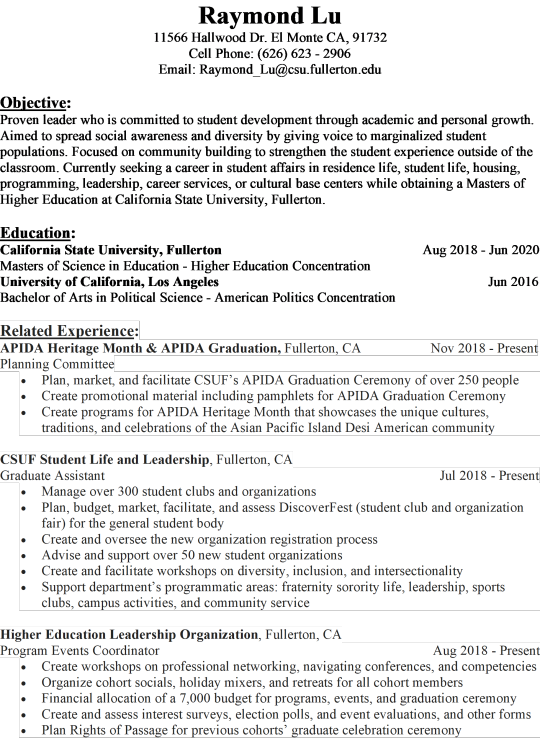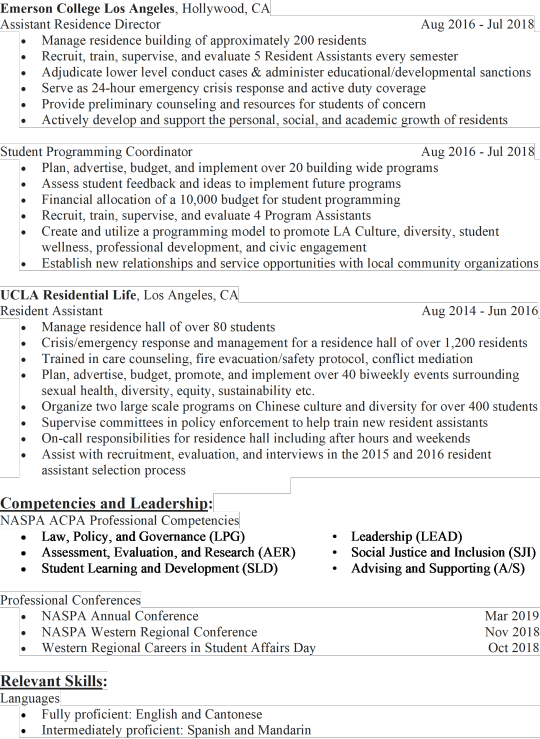M.S in Higher Education | Maywood Quadlead | HELO Treasurer | Internship Coordinator at Educational Partnerships
Don't wanna be here? Send us removal request.
Text
Mentorship
reTerm: Fall 2019
Description: The Higher Education Leadership Organization (HELO) coordinates a mentorship program between second-year and first-year MSHE students. This mentorship gives first-year students the opportunity learn from a second-year students and develop that relationship with someone who has been in their footsteps. It also gives second-year students the opportunity to share their insight, study notes, and experiences. The hopes of this mentorship is to build a lasting relationship between mentors and mentees beyond the MSHE program. Some relationships are purely academic/program base, but I was fortunate enough to have a mentor and mentee whom I plan to stay connected with even after I graduate.
Learning Outcomes:
Students will be able to develop a positive relationship with their mentee(s) and effectively communication throughout the MSHE program.
Students will be able to to share their experiences with their mentee(s) regarding the program, fieldwork, graduate assistantship, Maywood, comprehensive exams, conferences, etc.
Students will be able to reflect on their experience as a mentor and utilize that experience to better support students in the future.
Assessment Rubric:
Learning Outcome 1 (ADVANCED) - I believe that I am incredible fortunate to have found a mentor my first year who was just as ambitious, dedicated, and hardworking as me. Vy Pham is and will forever be my mentor and has taught me so much even after she graduated. When it was my turn to become a mentor, I tried mimic her mentorship style. This year, I had two wonderful mentees, Jarrod Ventura and Alvin Yi. I developed a positive relationship with both of them and maintained bi-weekly communication with them. I tried to check-in whenever possible via text or over lunch and made sure that they knew I was a resource for them.
Learning Outcome 2 (COMPETENT) - Throughout the program, I was able to share my experiences and honest opinion with my mentees. I recall several conversations about Maywood and HELO with my mentee because he wanted to know why I chose to be a Quadlead for Maywood and sit on the executive board for HELO. I was also able to offer my insight about fieldwork and how to start looking for placement sites early on.
Learning Outcome 3 (COMPETENT) - One of my mentees is incredibly inquisitive. Throughout this mentorship, I was able to share with him my knowledge of theory, history, philosophy, and assessment. He would ask what questions like, “How do you use this theory in your fieldwork?” These questions help me reflect on the different theories I have learned throughout the program and refreshed my memory in preparation for comprehensive exams. I believe that one of the best way to comprehend and master knowledge is to be able to articulate it to others in your own words.
Evidence:
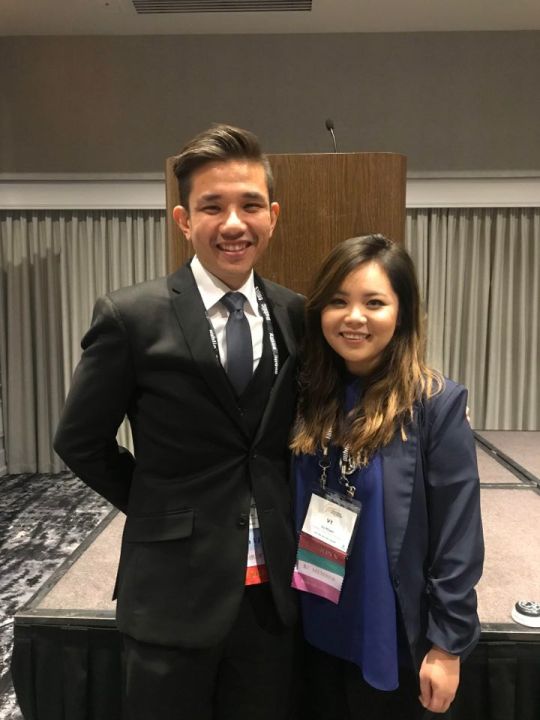
This is a picture of me and my mentor at the NASPA Western Regional Conference when she introduced me as the SA Speaker
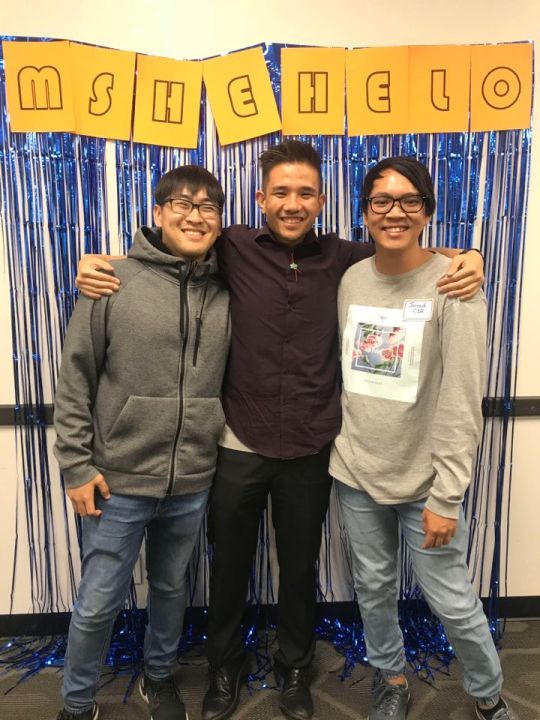
This is a picture during the HELO Mentor-mentee reveal.
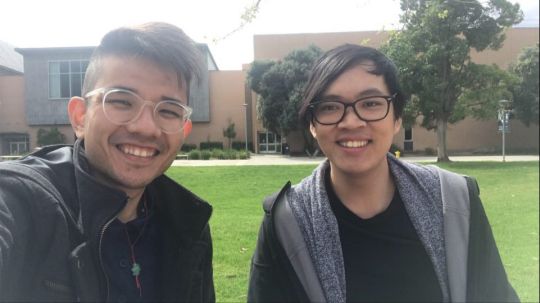
This is a picture of my me and my mentee having lunch together right before quarantine.
Reflection: Reflecting on my experience as a mentor, I could not have asked for better mentees. I think the relationships I have develop with Vy, Jarrod, and Alvin are unique in their own way. One of the greatest benefits of this mentorship program was being able to share not only my experiences but also my frustrations with them. I do not know how many times I have vented to my mentor or mentees about my Graduate Assistantship or virtual instruction. Since they have been through or are going through similar frustrations, we bond over our common resentment.
I hope that after I graduate, I will still stay connected in the lives of my mentees. I hope to guide them through things like Maywood, fieldwork and comprehensive exams during their second year of the program. Lastly, I hope I can be a resource for them in the field one day when they are job searching.
0 notes
Text
Personal Development
Definition:
Personal development is the growth of an individual overtime with self-reflection, educational intake, and interactions with their environment. We need to normalize the idea that people can change their mind and opinions when given new information and ideas. The most important aspect of personal development is the personal part. There is no single unit to measure growth and each individual has their own unique navigation and trajectory.
Learning & Experience:
Over the course of these two years, I think I grew significantly in my personal and professional development. When I entered this graduate program, I only wanted to work in Housing and Residential Life because that was the only experience I knew in Student Affairs. During my undergraduate experience, I never took the time to explore my identity. At CSUF, I was introduced to the Asian Pacific American Resource Center which helped me better appreciate my cultural background, my ethnic identity, and my upbringing. I learned so much about the Asian American identity beyond the model minority idea.
Throughout the program, I kept trying to explore the student population and conduct many of my research and projects on the Asian Identity. I did my research presentation on Institutional Support for APIDA students at CSUF, my museum visit on the Japanese American National History Museum, and my comprehensive exam on a prompt about an Asian American Resource Center. As I reflect on my experience in the MSHE program, I no longer see the individual who just wanted to do Residence Life. I see an individual who is passionate about identity develop and advocacy for underrepresented populations like Pacific Islander and Southeast Asians.
Goals & Growth: Looking towards the future, I hope my personal and professional trajectory will lead me into cultural affairs work. I hope to be working with the Asian Pacific Islander community whether that be in a cultural center or diversity work. I plan to continue working closely with this student population by attending conference like APAHE and being part of the API Knowledge Communities at NASPA conferences.
0 notes
Text
Assessment & Evaluation
Definition:
Assessment and evaluation is a process to ensure that the learning outcomes are met and to analyze how individuals can improve on future events. We utilize assessment and evaluation in the practice-theory-practice model to better implement programs for our students.
Learning & Experience:
In the first year of the MSHE program, after the few weeks, I already knew that I wanted to be a Maywood Quadlead. I was inspired by my mentor, Vy Pham, who was a Quadlead for the 2018 - 2019 Maywood Education Fair. With this in mind, I went to my first Maywood Education Fair with an open mind and pen and paper in hand. I wanted to learn everything I could that year in hopes to create a better fair for the following year. Assessment and evaluation has never been my strong feat. I had to put on a critical lens to assess the fair and contemplate what changes could be realistically made. This was one of my first experience utilizing practice-theory-practice and evaluation to implement change.
Another experience I have utilizing assessment and evaluation is with my fieldwork with Educational Partnerships. We plan countless events for middle and high school students throughout the semester that are “rinse and repeat” like our Kids to College event. One of the things we started doing was collecting student feedback to generate better workshops and events. Now with the COVID-19, our department has had a little more down time to analyze and synthesize that data and student feedback to better implement our Kids to College events for the future.
Goals & Growth:
I hope to continue developing my assessment and evaluation skills by practicing them in the field. I have a passion for event planning and programming, so this would be a great domain to improve on. One of my goals moving forward when planning events and programs is to always garner feedback. I think more often than not, many student affairs professionals are content with their work because it has become so repetitive. My goal is to always try and challenge systems that might be outdated or not inclusive. The best way to do that is through student feedback and evaluation.
0 notes
Text
Education
Definition:
Education has always played an important part in my life. My parents instilled this idea in me that education is the pathway to opening new opportunities and the gateway to social mobility. Education is about life-long-learning which means that we never stop learning. By growing our knowledge, we grow our capacity to empathize with, communicate, teach, and understand others.
Experience & Learning:
Throughout the course of the MSHE program, I have learned so much without even realizing it. I think it was at the middle of my Fall Semester in the second year of the program when I unknowingly referenced Practice-Theory-Practice when planning one of our Kids to College event at Educational Partnerships.
I like to think of myself as a person who loves learning. During my undergraduate career, I finished my Political Science major courses within the first two years. I had the option of graduating early or taking extra classes to fill my schedule. By the time I graduated, I took almost every course that remotely sparked my interest including Linguistics, Chinese, Spanish, Oceanography, Geography, History of Pop Culture, Stem Cell Research, Speech, Counseling, Human Anthropology, Marine Biology, Statistics, Forest Ecology, Theater, and more. Those these classes were trivial, I use the information I learned connect with some of the students I work with. For example, one of my Innovation Scholars is a Business major who really like marine life. I was able to connect with her about the importance of marine preservation from the information I retained in my Marine Biology class.
I think this experience highlights the importance of education and how it can connect people. For the field of student affairs, I think it is particularly important to understand cognitive theories because I care about identity development. Understanding the different cognitive stages of our students helps us better support them.
Goals & Growth
I definitely foresee myself going back and getting a doctorate degree one day. However, I am not sure if I want another degree in Education or another field of interest. I believe that student affairs professionals never stop our educational journey as we learn new things from our students all the time. I do not expect myself to memorize all the historical content of higher education or all the student development theories, but I hope to keep practicing them as grow in the field.
0 notes
Text
Social Justice & Advocacy
Definition:
What social justice and advocacy means to me is being able to utilize my power and privilege to support those from underrepresented backgrounds. As a student affairs professional and someone who is privileged enough to obtain higher education, I wanted to use my platform to advocate for students who are not as fortunate.
Learning & Experience
One of the great privileges and opportunity I had during my second year of the MSHE program was being able to present and speak at the NASPA Western Regional Conference in Portland. I had the opportunity to present research with my fellow API Cohortmates, Anthony Gong and Libby Dumanjug, to share our findings about Asian Pacific Islander support at CSU Fullerton. Additionally, I had the opportunity to present an SA Speaks reflecting on my background and identity to advocate for the Asian Pacific Islander community. I was able to use my platform at a Regional Conference to present information about the often overlooked APIDA student population to other student affairs professionals. That experience was an opportunity of a life.
Goals & Growth
Looking towards the future, I hope to continue to grow my education, thus growing my influence and platform so I can become a better advocate in the future. One of the areas of growth for me is to become an advocate for communities outside my own. Due to quarantine and the stay at home directives, I have been working on different assessment projects and resource guides for my work at Educational Partnerships. One of the guides that I created was the Titan Dreamer’s Resource Guide to support our undocumented students. After creating this guide, I learned so much about this student population and how little support exists for them. This is an area of growth for me to become a better advocate for all, not just those within my own identity.
0 notes
Text
Leadership
Definition:
Leadership has always been an area of growth and learning for me, even before the MSHE program. There are many perspectives as to what makes a good leader. For me, I believe leadership is being able to step up, speak up, and take responsibility when others are not willing to do so. My leadership style is tasked oriented meaning I like to take initiate and make sure the goal or outcome is met. When working in teams, I want to inspire other and ensure that we are all working towards the same goal. That is what leadership means to me.
Learning & Experience:
Throughout the MSHE program, I have always tried to take initiative and step up to positions of leadership. Since the first year of the program, I knew that I wanted to be a Maywood Quadlead because my mentor, Vy Pham, inspired me. She warned me about how time consuming and how tiring it can be, but I was up for the challenge. I wanted to work with my cohort to create an educational fair that truly makes an impact on the community. I was up for the challenge.
What I did not expect was all the other responsibilities that piled on at the same time. After my first year being a Program and Event Coordinator for HELO, I wanted to focus my second year in the program on Maywood. When eboard elections came out, I did not sign up to run for a position. However, the previous president of HELO reach out and asked me to be the Treasurer. No one else was willing to step up and without a Treasurer, we would not have a student organization, so I agreed. Unfortunately, this was around the same time that I started my new position with Educational Partnerships. All of these responsibilities and leadership opportunities really spread me thin.
I learned that just because I can take on leadership roles does not mean that I should. I also learned how to say “no”. To me, leadership is not about the title or acknowledgement, but rather about the cause. If I cannot be the best Quadlead for Maywood or Treasurer for HELO because I am spread so thin, then it is a missed leadership opportunity for myself and others who could have potentially done a better job.
Goals & Growth
In the future, I hope to take on more leadership responsibility where I can and when I can. There are several things that I am passionate about which I am willing to step up and speak up for. One of my goals is to become a leader in my Asian Pacific Islander community. I hope to work with this student population and support them utilizing my background, identity, and power. I hope to be a leader in the community to create change especially for marginalized communities like Southeast Asian and Pacific Islanders.
0 notes
Text
5 Learning Domains
Use the following learning domains to navigate the different E-Portfolio entries.
LEADERSHIP
Higher education master’s degree students will become leaders who are able to apply fundamental leadership and organization theories along with core management skills (e.g., planning, environmental scanning, legal compliance, risk management, use of technology, budgeting, and human resource management) to student affairs practice as reflected in case study analysis as well as in practicum and fieldwork experiences.
Click HERE for all entries that fall under the Leadership domain.
SOCIAL JUSTICE & ADVOCACY
Higher education master’s degree students will become social justice advocates who are able to draw upon a deepened understanding of their own cultures, the cultures and characteristics of college students, and institutional structures in order to develop educational programs that promote educational access and success for all students, especially those from historically underrepresented populations.
Click HERE for all entries that fall under the Social Justice & Advocacy domain.
EDUCATION
Higher education master’s degree students will become educators who are able to draw upon an analysis and evaluation of the historical and philosophical foundations of the student affairs profession as well as major student development theories (psychosocial, cognitive, moral, life-span, typological, and college impact) to develop educational programs that promote student development and learning.
Click HERE for all entries that fall under the Education domain.
ASSESSMENT & EVALUATION
Higher education master’s degree students will become professionals who are able to demonstrate their understanding of student affairs scholarship in the analysis, synthesis, and evaluation of current research, who can design processes to assess student learning and development in the co-curriculum, an who can plan and implement formative and summative program evaluations and research projects.
Click HERE for all entries that fall under the Assessment & Evaluation domain.
PERSONAL DEVELOPMENT
Higher education master’s degree students will become practitioners who articulate a clear philosophy of student affairs, and who systematically draw upon personal reflection regarding their strengths and weaknesses as well as upon feedback from mentors to enhance their personal and professional development.
Click HERE for all entries that fall under the Personal Development domain.
0 notes
Text
Virtual Instruction and Telecommuting
Term: Spring 2020
Description: 2020 has been a crazy year to say the least. With everything that has happened with COVID-19, virtual instruction, and telecommuting, so many expectations have changed and it feels somewhat unreal. As the year comes academic year comes to a close, all the celebratory and major events like Rites of Passage, completing comprehensive exams, and graduation that we looked forward to were either cancelled or moved virtually. These times have been rough and I would like to share some of the projects that I am working on and my experiences.
Learning Outcomes:
Students will be able effectively telecommute and complete assessment projects with the same level of effort and productivity.
Students will be able to learn through virtual instruction to finish out the academic year.
Students will be able to stay connected to the cohort and campus community through virtual engagement platforms.
Assessment Rubric:
Learning Outcome 1 (COMPETENT) - Working from home has been extremely unproductive at times as I wait for directives from my supervisor or correspondents to email me back. Other times, I feel overwhelmed with work as more and more projects pile on. I would rate myself competent in this area because I am very proud of one of the projects that I completed. My supervisor tasked me with creating a resource guide for our Titan Dreamers (Undocumented students). The resource guide came out amazing and was shared with the Division of Student Affairs.
Learning Outcome 2 (BASIC) - Virtual instruction has been one of the most difficult parts of the whole pandemic and stay at home order. I do not feel productive in a virtual learning environment compared to the classroom setting. I did not feel engaged during our Zoom calls and that the latter half of the semester, I did not learn anything through virtual instruction. The one redeeming factor is was the case studies that we discussed in our Fieldwork course. Those were helpful and followed the similar format of discussion as we would have had in class.
Learning Outcome 3 (COMPETENT) - Throughout the “Stay at Home” order and quarantine, I was able to stay connected with CSUF’s campus through virtual platforms. I was able to schedule informational interviews and sit in on hiring committees around campus to stay engaged and informed with everything happening at CSUF. Additionally, there are a select few cohortmates that I am very close to and still talk to on a weekly basis.
Evidence:
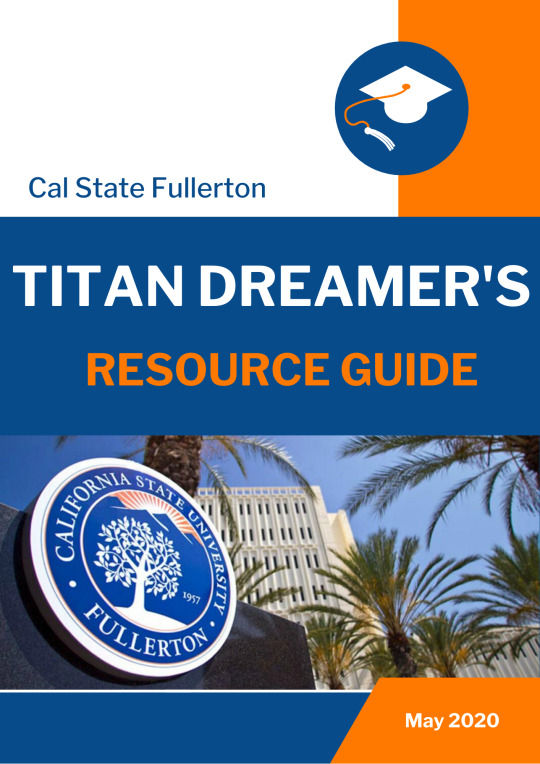
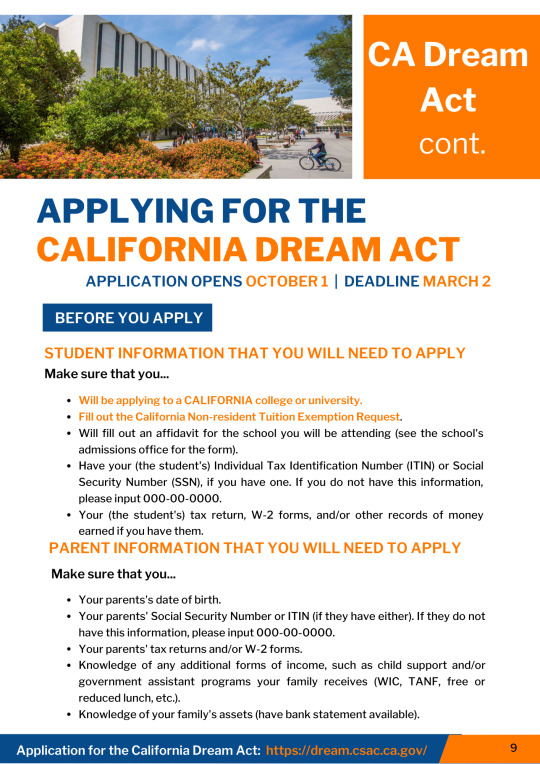
These are some of the pages in the newly created Titan Dreamers Resource Guide that I have been working on during telecommuting.
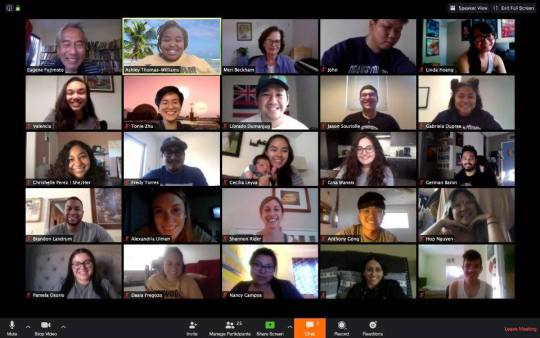
Our last class meeting as a cohort.
Reflection: As the academic year draws to a close and all our affairs are in order, I will miss the time spent and shared in the program. I appreciate all I have learned from the faculty, my cohortmates, and the field. As the program finishes and many of us start looking for jobs in the field, I am grateful to have a full-time position with the Center for Educational Partnerships. Over these past few months, I have been working from home and working on different assessment projects since we have more down-time now.
One of the projects that I am most proud of is the Titan Dreamers Resource Guide. I have little to no experience working with the undocumented student population and creating this guide was eye-opening for me. There is so much legislation and regulations that prohibit our Titans Dreamers from getting the same support and resources as other students. This guide help me better understand how to serve these students and become an ally for them.
0 notes
Text
Maywood Education Fair / 10 Year Celebration
Term: Fall 2019
Description: The 2019 Maywood Education Fair took place on Saturday, October 12, 2019 in St. Rose of Lima School. This event was organized by Cohort 11 with the leadership of four Quadlead who oversaw different committees to plan, budget, facilitate, execute, and assess the fair. As one of the four Quadleads, this event was the result of months of hard work, countless hours of meetings, and constant communication with our committees. The hopes of this event was to create an educational fair to teach parents and students about the college, fundraise for scholarships for graduation seniors, and to create a college going culture in the community of Maywood.
Learning Outcomes:
Students will be able plan, budget, observe, facilitate, critique, and assess the Maywood Education Fair in their role as Quadlead.
Students will be able to delegate tasks and rely on committee members to ensure that the fair runs effectively.
Students will be able to assess and observe the educational workshops put on by the Educational Workshop Committee.
Students will be able to learn about the history and development of Maywood and utilize Community Cultural Wealth Model to understand the importance of the event.
Assessment Rubric:
Learning Outcome 1 (ADVANCED) - Between the four Quadleads, I believe the we planned a pretty great Educational Fair. Despite the lack AT&T funding, we increased our funding initiatives, our outreach efforts, and our committee responsibilities. We successfully planned, budgeted, observed, facilitated, and assessed the Maywood Education Fair giving out more than $24,000 in scholarships and overfilling our capacity at St. Rose of Lima.
Learning Outcome 2 (COMPETENT) - The day of the Maywood Education Fair, there were tons of issues to trouble shoot from overfilled classrooms to projectors not working. I was able to rely on my committee to work out many of those issues and resolve them before anything too critical happened. However, we should have better prepared and should have been more proactive prior to the day of the event to anticipate these issues.
Learning Outcome 3 (COMPETENT) - The Educational Workshop committee was a new experience for me. Although I have put on many events and workshops in the past, this was not comparable given the different age groups and learning areas. I would rate myself competent as I was able to visit all of the workshops on the day of the event. However, I was not able to observe all of them in great depth given the different issues that required trouble shooting the day of the event.
Learning Outcome 4 (ADVANCED) - Throughout the planning and execution of the Maywood Education Fair, I intentionally tried to utilize the Community Cultural Wealth Model to understand the community. This lens was extremely helpful for the Educational Workshop committee because we were able to incorporate linguistic and familial capital into our learning outcomes.
Evidence:
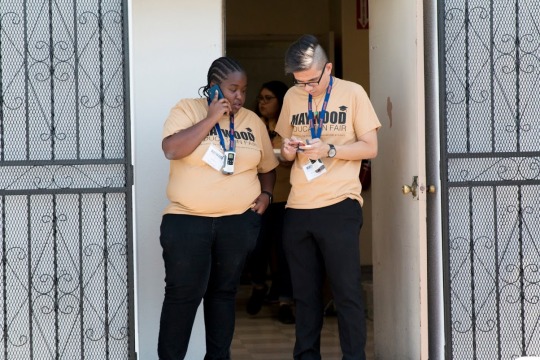
Quadlead Ashley Thomas Williams and I trouble shooting on the day of the fair.
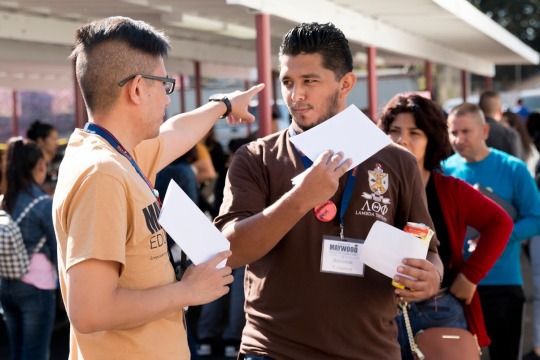
Giving directions to one of our helpful volunteers.
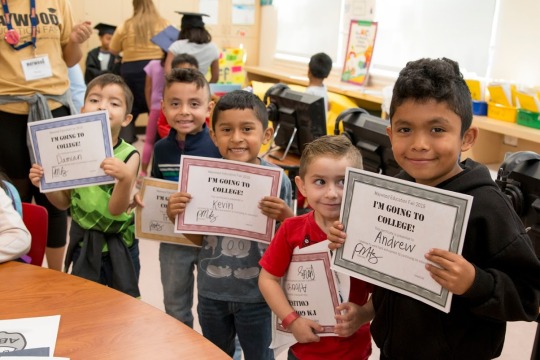
Students in the K-2nd workshop receiving their certificates that say “I’m going to College!”
Reflection: The Maywood Education Fair was an insightful experience. The day of the event was absolutely fruitful to see all of the hard work and time that we put into the fair all play out. I remember in 2018 seeing my mentor Vy Pham running around like a chicken with its head cut off on the day of Maywood. Despite all the proactive steps put in place, we still had so many issues arise on the day of the fair. For example, the fair lines were backed up down two blocks, all the educational workshop classrooms were over capacity, and we ran behind schedule during the welcome ceremony. The day of the event was incredibly hectic, but at the end of the day when the scholarships were being passed out and we were able to hear excerpts from each of the recipients’ essays, it made it all worth it.
0 notes
Text
NASPA Western Regional Conference/SA Speaks 2019
Term: Fall 2019
Description: NASPA Western Regional Conference took place in Portland on November 2nd - November 5th. The theme of this conference was Building Bridges and Making Connections which encouraged student affairs professionals to develop relationships with one another, to make lasting connections with our students, and to bridge pathways to students who are too often marginalized. During this conference, I was able to present a spoken word piece titled Education is NOT a Bridge for All as an SA Speaks and present research on Institutional Support for the Asian American community. This was my third professional conference and I have learned how to better navigate them.
Learning Outcomes:
Students will be able to develop a spoken word piece that incorporates social justice, advocacy, equity, inclusion, and personal/cultural experience.
Students will be able to network and develop strong relationships with professionals in the field of student affairs.
Students will be able to attend different workshops and sessions to learn more about the Asian American identity in relations to student affairs and higher education.
Assessment Rubric:
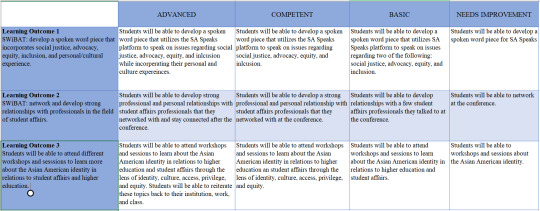
Learning Outcome 1 (ADVANCED) - I was able to develop a spoken word piece utilizing my personal and cultural experiences and utilize my SA Speaks platform to speak on issues regarding social justice in the field, advocacy for marginalized communities, equity, and inclusion.
Learning Outcome 2 (COMPETENT) - I was able to develop good professional and personal relationships with some of the people I met at the conference. I was able to successfully network during some of the breakout sessions and lunch. I reached out to some of these student affairs professionals after the conference via email.
Learning Outcome 3 (COMPETENT) - Most of the sessions that I attended were for the Asian Pacific Islander community. One of the sessions I attended was about cultural circles. This session was informative , learning about different culture’s traditions. One of the activity was how to encourage marginalized communities to speak out more and develop spaces for them. I will definitely utilize this activity in my future career when working with different student communities.
Evidence:
https://www.youtube.com/watch?v=eUt1PWaPFWs
This link above is the video recording of my SA Speaks. It is a spoken word piece that is titled Education is NOT a Bridge for All.
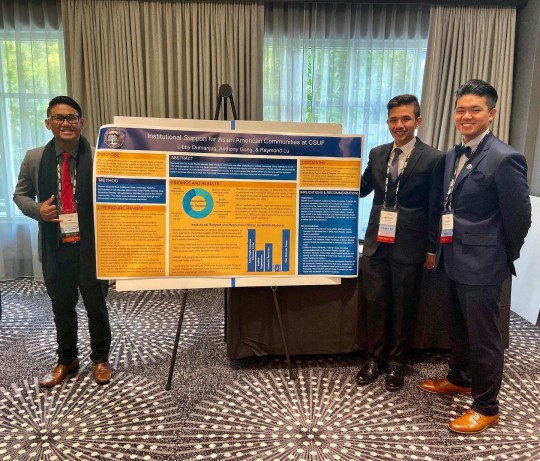
The photo above was taken at the conference where my cohort-mates (Libby Dumanjug & Anthony Gong) presented our post research on Institutional Support for the Asian American Communities at CSUF
Reflection: I remember writing about the in an earlier e-portfolio entry that I wanted to present research in a future conference. All throughout high school and two years of my under-graduate career, I was a part of the Speech and Debate team. I loved writing spoken word and poetry but unfortunately lose that passion along the way. This NASPA Western Regional Conference gave me that exciting new platform and opportunity to re-explore that passion combined with my passion for equity and inclusivity work.
It was truly an eyeopening experience and has really encouraged me to write spoken word again. Moreover, I would love to attend another professional conference in the future and hopefully utilize that platform to present more research or speak again.
0 notes
Text
Maywood Preparation
Term: Summer 2019
Description: I am honors to be nominated by my fellow cohort mates and MSHE faculty to be a Quadlead for the 2019 Maywood Education Fair. Since this year is the celebratory 10 year anniversary of the fair, I am excited to work with the advisor and my fellow Quadleads to plan a successful event. When speaking to past Quadleads, many of them said that planning is an integral part of the fair. Most of the work is done ahead of time before the day of the event and even before the start of the Instructional Leadership course. My goal for planning the Maywood Education Fair is to prepare and plan everything over summer so it will be a smooth integration for the cohort to execute a successful fair.
Learning Outcomes:
Students will be able to work with fellow Quadleads and the Maywood advisor to plan and perfect the Maywood Education Fair during the Summer before the Instructional Leadership course.
Students will be able to develop strong working relationships with fellow Quadleads to create a productive atmosphere of support.
Students will be able to equitably divide up the work for the logistics, fundraising, volunteers, outreach, resource fair, and educational workshops for the Maywood Education Fair.
Assessment Rubric:
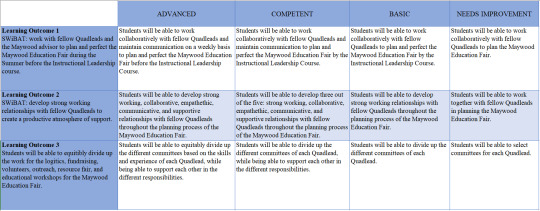
Learning Outcome 1 (Competent) - With class, homework, research projects, fieldwork, work, extracurriculars, relationships, family, and everything else, Maywood and its responsibilities became quite difficult to juggle. However, over the summer, the four Quadleads were able to meet with Dr. Fujimoto, the Maywood advisor on a weekly basis to plan and coordinate the moving parts of the Maywood Education Fair.
Learning Outcome 2 (BASIS) - Working with my fellow Quadleads has been one of the most challenge part of the planning the Education Fair. I believe that we were all under high stress environments and very different working styles which made for a lot of quarrels and disagreements. I tend to work very independently and do not appreciate group projects. This made it more difficult especially since there needed to be constant communication. I feel that I could have done more to empathize and support my fellow Quadleads. This is definitely an area that I could improve on.
Learning Outcome 3 (Competent) - I believe that as Quadleads, we were able to divide up the work of Maywood pretty equitably. The divisions were broken down as follows. Ashley Thomas Williams - Logistics and Fundraising because she is detail oriented and has experience fundraising. Chrishelle Perez - Resource Fair and Volunteers because she is organized and knows how to manage. Gabby Dupree - Outreach and Scholarships because she has linguistic capital for outreaching in the community. Raymond Lu - Educational Workshops and College of Education Liaison because experience with workshops and networking capabilities.
Evidence:
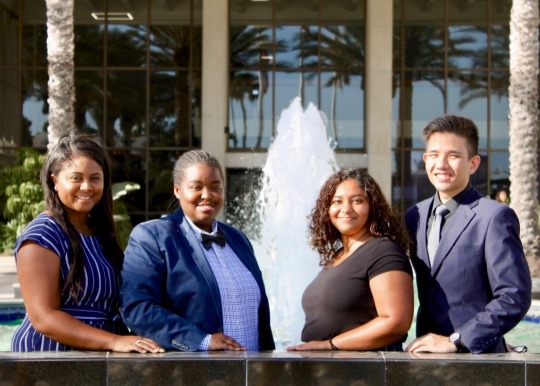
Maywood Quadleads for the article published in the Daily Titan.
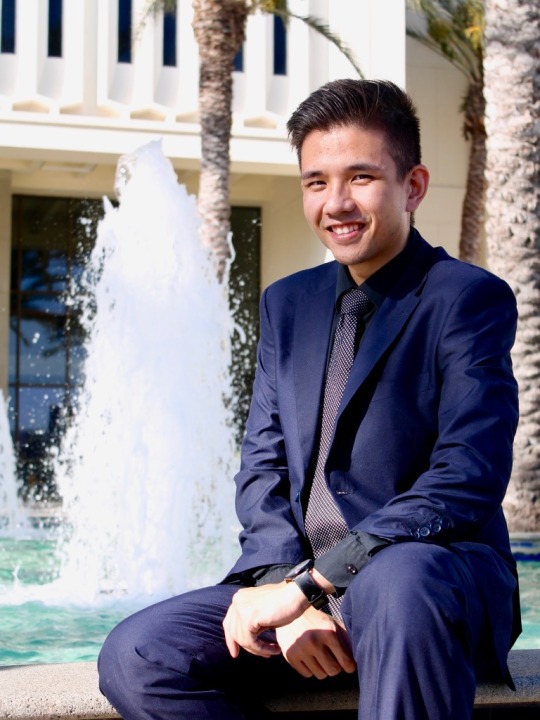
Individual Quadlead head shots leading up to the Maywood Education Fair.
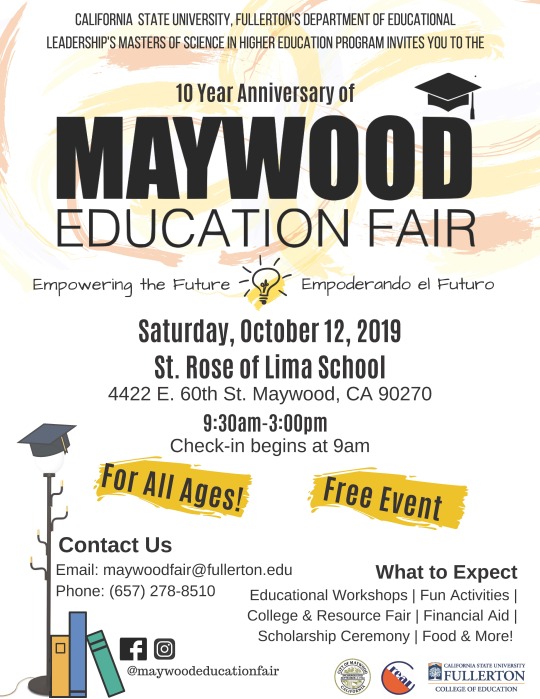
The Maywood Education Fair flyer we designed to be distributed to Cohort 11 and Cohort 12 at the beginning of the Fall semester.
Reflection:
For me, the most difficult part of being a Quad Lead was working with my peers, especially some of my fellow Quad Leads. It was incredibly challenging because quite frequently, we did not see eye to eye. More often than not, I focus on my own responsibilities while trying to balance work, class, family, relationships, NASPA Western Regional presentation, homework, and Higher Education Leadership Organization (HELO). It was a delicate balance trying to keep up with all those responsibilities, however, it was still manageable. Unlike the other Quad Leads, I am not as expressive of my struggles as they are because I tend to internalize or work through them. Moreover, I am not as empathetic as I could have been because of these internalized stressors. I was focused on getting the work done and making sure it is done correctly rather than supporting my peers. I am very individualistic and work better own my own than in group settings. I picked up this trait because I am a first-generation student and my parents did not advance beyond elementary school in their education. After about the fourth grade, I no longer had anyone I could depend on to help me with math, English, or homework. I learned to be independent and carried that mentality with me throughout my college career. About two months into planning Maywood, I realized that my working style and individualistic nature was very healthy for a team environment. I was too focused on planning the Maywood Education Fair that I lost sight of my peers. After some difficult conversation and self-reflection, I realized that Maywood will still happen even if it is not perfection, but some of those relationships might not be there. Building relationships is not easy for me in high stress environments, but I had to change my working styles and unlearn my individualistic mindset. I started being more transparent with my team. This by far was the most challenging part of planning Maywood because asking for help in my mind was always a sign of weakness to me. This was one of the hardest things I had to unlearn, but it really paid off in the end. I do not believe that I could not put on the Maywood Education Fair without the support of my diligent committee and the help of my fellow Quad Leads.
0 notes
Text
Current Educational Philosophy
EDAD 568: Higher Education Fieldwork Fall 2019 California State University, Fullerton
Within Student Affairs, I believe there is always a push and pull to do what you believe is right and to do what is best. For example, when it comes to free speech or university policy, sometimes those values do not align with our personal ones and it becomes an internal conflict. Do I enforce a policy, department, or institution that I do not morally agree with or am I willing to give up some of my values for my personal, professional, and financial growth? I believe that the Master of Science in Higher Education has development me to be more culturally aware and social justice oriented over this past year. Likewise, I believe that my learning, experiences, and readings has significantly changed my perspective on student affairs, my world views, and my educational philosophy.
My educational philosophy paper, when I first started the MSHE program, mentioned my work with the Office of Student Life & Leadership. In that paper, I reflected on the task-oriented role in helping student clubs/organizations re-register. I also commented how I was able create transformational change through my one-on-one interactions with students by developing their passions and providing them with leadership opportunities. As I transitioned into my second year of the MSHE program, I continued to volunteer for SLL, though I am no longer a Graduate Assistant.
During LEADCON, a leadership conference that gives student organization members the knowledge and tools they need to run their clubs, I was to present a session on Stress Management. The theme of LEADCON for Summer 2019 was Video Games. The title of my Stress Management session was called The Oregon Trail of Leadership: Prioritizing Your Life & Managing Stress. After the first LEADCON, students were able to provide feedback on each session. One student who identified as Native American stated, “As an indigenous person from an indigenous organization, I didn't find the name of this session to be appropriate.” As advocates of social justice and cultural inclusivity, I proposed to change the name of this session to my supervisor for future LEADCONs. My supervisor responded by saying, “Since our marketing and promotional material has already been printed, emailed and distributed, we would do not want to change the name of the session.” I accepted my supervisor’s response and continued to present at LEADCON, while addressing the cultural implications behind the title at the start of every session. However, after the second LEADCON, my supervisor changed the title of a session from Redefining Masculinity to Redefining Male Leadership in hopes to garner better attendance.
I was baffled and upset at my supervisor’s decision to easily change the name of one session, but not the one that was culturally offensive. There was a deep internal struggle of doing what is right and doing what is best when contemplating this predicament. On one hand, I wanted to resign from my volunteer position in Student Life & Leadership. The historical and cultural oppression behind the Oregon Trail was the force removal of indigenous populations, where tens of thousands perished in the relocations. With today’s political climate, this idea of displacement and forced migration is even more reason to change the name of the session. On the other hand, I appreciate all the opportunity, growth, and development that Student Life & Leadership has given me. I wanted to continue my work with them to further develop my professional network and rapport.
This decision was incredibly difficult because of the push and pull of what I believed was the right thing to do and what I perceived as the best thing to do. After speaking with some faculty members, some of my cohort mates, and my mentor, I decided to resign my volunteer position with Student Life & Leadership. Although I cherish my time at the department, my educational philosophy is be culturally competent and socially aware. This means that I will advocate for those who are historically marginalized and statistically underrepresented. I will be an ally for communities within my intersecting identities to bring about social and cultural awareness. Lastly, I will be a proponent of social justice and use my power, privilege, and access to create more equity in higher education. Sometimes my educational philosophy might guide me to do something that is not the best option, but I hope that it will always be the right option.
0 notes
Text
Institutional Support for Asian American Communities at CSUF
Term: Summer 2019
Description: As part of EDAD 510 and EDAD 522, students of the MSHE program must complete and present a research project on student characteristics and populations. The purpose of this research was the see if California State University, Fullerton provides any institutional support for students who identify within the Asian Pacific Islander Desi American (APIDA) population. We aim to uncover where this institutional support comes from; whether from academics, student affairs, or extracurricular. We understand that students from the APIDA community are often overlooked at most college campuses. Many institutions do not offer dis-aggregated data under the Asian umbrella. Therefore students who identify as Southeast Asian or Pacific Islander are overlooked and do not receive the necessary institutional support they need to succeed. Our research recommends student affairs practitioners make intentional efforts to provide this historically marginalized population with more resources and institutional support.
Learning Outcomes:
Students will be able to conduct qualitative research by interviewing Asian Pacific Islander Desi American students at California State University, Fullerton through semi-structured, one-on-one or two-on-one interviews.
Students will be able to find and compile an in-depth literature review regarding institutional support for the Asian Pacific Islander Desi American population.
Students will be able to synthesize and analyze data to formulate trends based off student responses to generate results and recommendations for institutions to better support the Asian Pacific Islander Desi American student population.
Assessment Rubric:
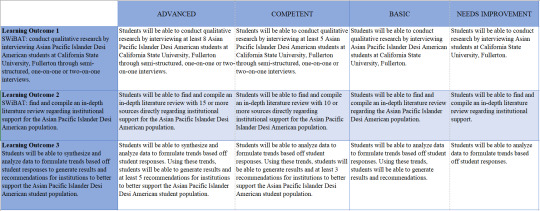
Learning Outcome 1 (COMPETENT) - The change from the Student Characteristics course from the Fall to Summer created many challenges in terms of completing this research project. Our research was aimed to support students who identified with the Asian Pacific Islander Desi American population, therefore we wanted our research and interviews to reflect the underrepresented communities within APIDA like Pacific Islanders, Southeast Asians, and Desi Americans. With the limited student population over summer, we were able to get 6 participants who identified within the APIDA community to participate in our interviews. These interviews were semi-structured, one-on-one or two-on-one interviews.
Learning Outcome 2 (ADVANCED) - Within EDAD 510, the assessment course, each assessment group was responsible for finding 18 literature reviews for the research project. We were able to find over 18 literature reviews that pertain to socio-economic status of API students/families, Native Hawaiian retention, the importance of dis-aggregated data, the model minority myth, Asian Americans in STEM, and implications of how racism still exists for the APIDA community. Using these literature reviews, we were able to back up our recommendations and results.
Learning Outcome 3 (ADVANCE) - Data and assessment was never my strong suit because I have little to no experience in it. However, this project challenged me to analyze data and draw trends from our student interviews. I was able to synthesize our interview transcriptions and generate recommendations for institutions to critically review and consider to better support the APIDA community at their campus.
The institution should hire more APIDA staff and faculty members to match the 21.36% Asian/Pacific Islander student population.
Resources and institutional support are available, to students but not well advertised. For example, Asian American or Ethnic Studies courses should be recommended to students regardless of major.
California State University, Fullerton does not utilize disaggregated data when gathering data on the Asian Pacific Islander Desi American students. This data would benefit students who identify as Pacific Islander or Southeast Asian in receiving better institutional support.
None of the students we interviewed mentioned Financial Aid as a resource. However, we know that many students within the Pacific Islander and Southeast Asian community struggle financially. The institution should make Financial Aid more visible and accessible for APIDA students.
Evidence:
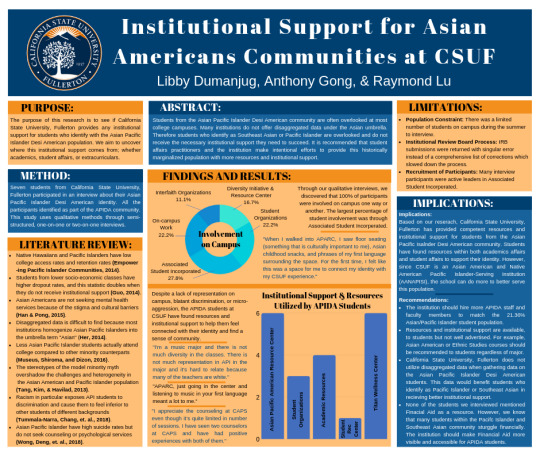
Our project that we will be presenting at NASPA Western Regional Conference and the 9th Annual College of Education Research Symposium.
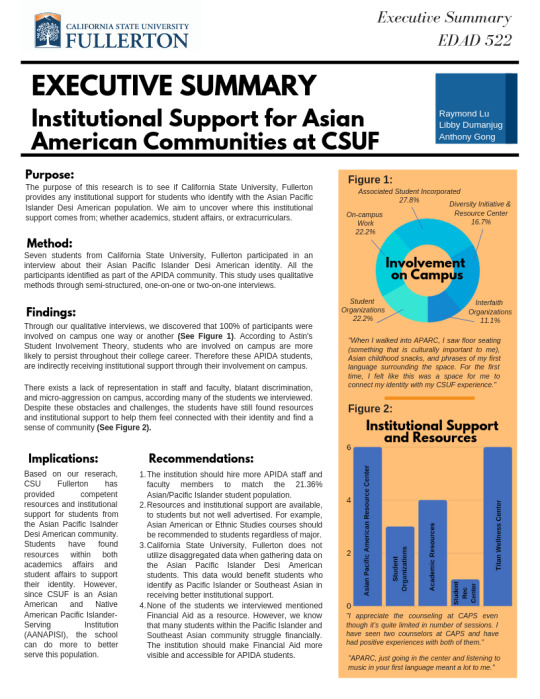
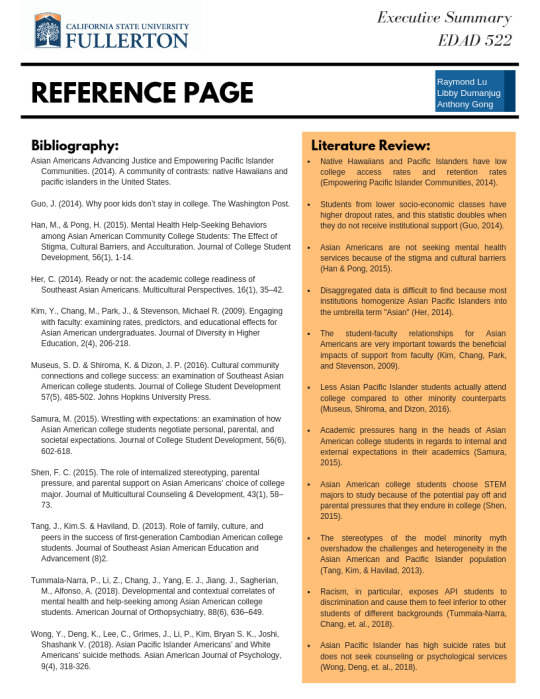
Our Executive Summary and handout that we will be passing out to summarize our project.
Reflection:
After entering graduate school, I developed a passion for identity development and serving underrepresented student populations. Through this assessment project and the literature reviews, I was able to better develop my sense of identity around the Asian Pacific Islander Desi American community. In addition, this project allowed me to conduct research to better serve some of the identities that are underrepresented in the Asian community like Southeast Asians and Pacific Islanders. By conducting these interviews, I was able to gain a little more insight to how California State University services our students and makes them feel “at home” on campus.
I was very surprised to learn that 100% of our participants were involved on campus one way or another. The largest percentage of student involvement was through Associated Student Incorporated. Our finding show that California State University, Fullerton has provided competent resources and institutional support for students from the Asian Pacific Islander Desi American community. Students have found resource within both academic affairs and student affairs to support their identity. I am proud of our institution, but I believe there is so much more work that can be done to better support this underrepresented student population.
0 notes
Text
Internship Coordinator for Educational Partnerships
Term: Summer 2019
Description: After completing my first year in the MSHE Program and my Graduate Assistantship with the Office of Student Life & Leadership, I wanted to take on a different role on campus and broaden my field of expertise. In the middle of May, I accepted a position as the Internship Coordinator with Educational Partnerships working with Anaheim Public Utilities for a pilot grant fund. In this position, I oversee two interns and serve as the liaison between Educational Partnerships and the City of Anaheim Public Utilities.
Learning Outcomes:
Students will be able to recognize the importance of Educational Partnerships and the pipeline it creates for underrepresented students to attain higher education.
Students will be able to oversee student interns and aid in their personal growth, professional development, and overall success.
Students will be able to balance their new position with their continual involvement in Higher Education Leadership Organization (HELO) and Maywood.
Assessment Rubric:
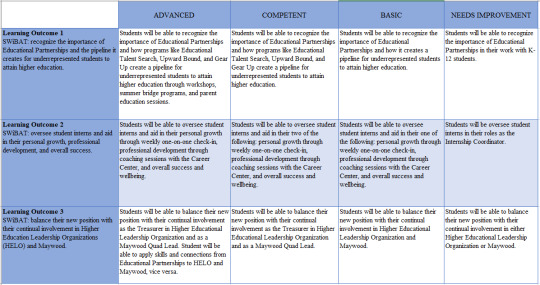
Learning Outcome 1 (ADVANCED) - Coming into Educational Partnerships, I dove head first into this pilot position with the City of Anaheim Public Utilities. Prior to this position, I had absolutely no idea what what Educational Partnerships was or did. In my position, I was able to learn about some of the work they do in Gear Up, Educational Talent Search, and Upward Bound. In addition, I was able to sit in on some of the different program such as the Parent Walk, Gear-Up University, and the Gear-Up Academic Coordinator Search Committee. All of these opportunities gave me a better understanding of how Educational Partnerships builds that pipeline for K-12 students to get more equitable access to higher education.
Learning Outcome 2 (COMPETENT) - In my position as the Internship Coordinator, I oversee two student interns over the Summer as part of the pilot grant. Navigating this position was a bit challenging because it was new and there is no existing manual or protocol for how to succeed in this position. I used my experience as an Assistant Residence Director to create a guide for my interns to help them personally grow, professionally develop, and overall succeed. I was able to check-in with them on a weekly basis, I was able to schedule professional development sessions for them around “Maximizing their Internship”, “Professional Etiquette”, and “Networking” through the Career Center. However, because this was all new to me, I am not sure if I was the best supervisor for the interns, but I am learning and growing myself in this role.
Learning Outcome 3 (ADVANCE) - As I transitioned into this new role with Educational Partnerships, I also transitions into a Treasurer role in Higher Education Leadership Organization as well as a Quad Lead for Maywood. I have been very active in HELO as one of the returning eBoard member, I have been helping organization the leadership transition and event timeline for the new leadership team. In addition, I have been active in Maywood and with my Educational Workshop Committee. I am hoping to start a partnership between my committee and the work I do in Educational Partnerships because this department also hosts a lot of workshops for K-12 students.
Evidence:
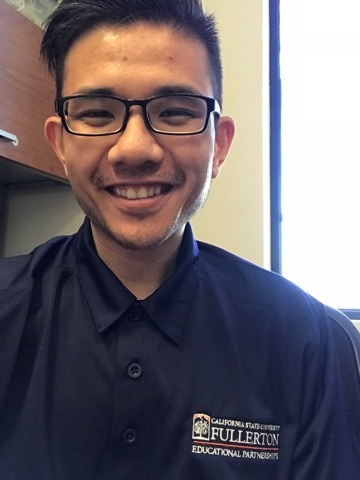
Representing Educational Partnerships with the staff polo.
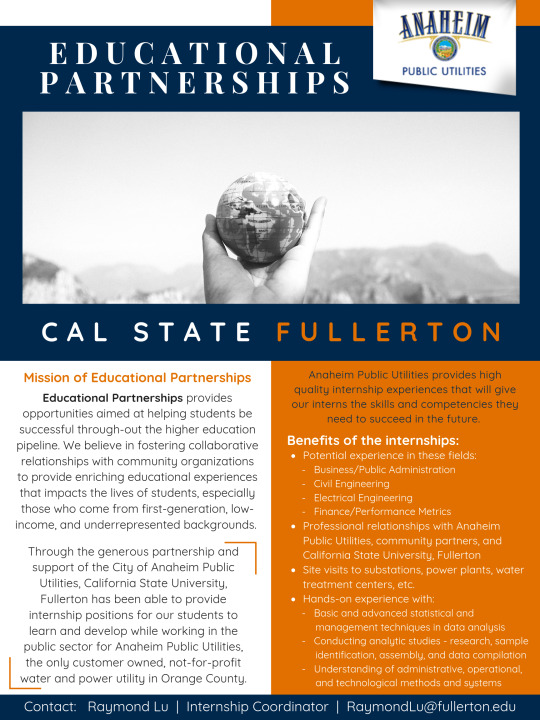
A flyer I designed to promote the Anaheim Public Utilities Internship opportunity.
Reflection:
Diversity is a word often thrown around in higher education to entice prospective students, to qualify for grants and funding, or just to sound good on paper. However, rarely do institutions of higher learning truly embody the create conditions for equitable outcomes that close the racial and ethnic gaps for students of the underrepresented communities. I understand the difficulties of selecting students based on racially conscious affirmative actions, which is why there are so few institutions that are devoted to this cause. However, by doing this we are creating that even, equitable playing field for all students. In May, I started my new position at Educational Partnerships at CSUF as an Internship Coordinator. During my on-boarding, I learned so much about the different programs that exists within Educational Leadership like Gear-Up, Upward Bound, the McNair Scholars’ Program, and Educational Talent Search. All these programs exist as a pipeline to help underrepresented high school students such as Black and Latino students, first generation students, or low-income students get into college. I work with some of these programs to introduce high school students and families to the college system and provide them with the tools they need to succeed. Higher education was originally created for white, affluent, and religious men, not for people of color. By creating this pipeline for students of color from high school to college, we are developing a campus culture of diversity.
I am grateful for this opportunity to work in a department that is dedicated to diversity and equity. I am grateful to get some supervisor experience in my role to oversee two student interns and hire more for the Fall and Spring semester. I am also proud of myself to be able to manage this new position while balancing my commitment in Higher Education Leadership Organization and Maywood. I am passionate about my work with Educational Partnerships to bridge that equity gap and to not only promote, but actively create diversity for Cal State Fullerton.
0 notes
Text
Rites of Passage
Term: Spring 2019
Description: On Wednesday, May 15th, MSHE Cohort 11 planned the Rites of Passage - the Graduation Ceremony for Cohort 10. Rites of Passage celebrates all the accomplishments and achievements of the graduating cohort. The features keynote speakers, recognition, One Word Project, research presentation, gifts, tickets, the Carr Fellowship Award, and celebration with family and friends. Rites of Passage planning is led by the Higher Education Leadership Organization (HELO) Program and Events Coordinator (PEC) which was just me this year.
Learning Outcomes:
Students will be able to organize and manage 4 different committees: Program Committee, Outreach Committee, Logistics Committee, and Entertainment Committee and delegate tasks for all cohort members.
Students will be able to plan, advertise, budget, facilitate, and evaluate the Rites of Passage graduation ceremony
Students will be able to recognize and understand the diversity component that exists within the Masters in Higher Education program through the Rites of Passage graduation ceremony.
Assessment Rubric:
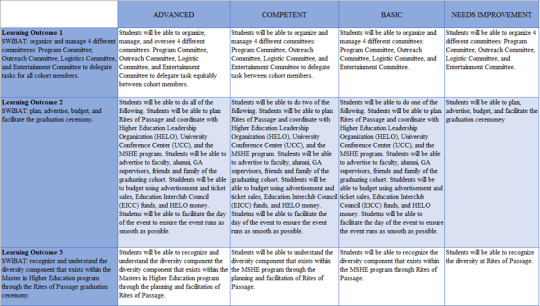
Learning Outcome 1 (ADVANCED) - Planning Rites of Passage was an amazing experience. Typically, Rites of Passage is planned by three HELO Program and Events Coordinators, however, this year I was the only PEC in HELO. I took on the task of planning ROP by myself. I met with the previous HELO PECs and got a basic outline of the event. I was able to create four committees and divide up our cohort members into the committees based on their skills and interests. The Program Committee was responsible for creating the actual program including all the advertisements, pictures, and recognition. The Entertainment Committee was responsible for coordinating the music, One Word Project, and the slide show. I created the Logistics Committee to help me oversee the planning and organization of the event including decorations, theme, script, and run-of-show. Lastly, the Outreach Committee was responsible for marketing and selling advertisements for the program.
Learning Outcome 2 (ADVANCED) - I was the lead for planning Rites of Passage. I coordinated with the University Conference Center to finalize the layout with all the last minute changes. I worked with MSHE and HELO to coordinate our marketing strategies to all the alumni, faculty, graduate assistantship supervisors, family, and friends of the graduating cohort. I also assisted the Outreach Team in collecting ticket money as well as advertisement money for the program. I budgeted the program without a proper transition from previous years and still managed to raise some funds through the event. I coordinate with the Education Interclub Council, HELO, and the Fundraising Committee to budget for ROP. Lastly, on the day of the event, I was able to facilitate and see all the back-end work come to fruition.
Learning Outcome 3 (COMPETENT) - During the planning stages of Rites of Passage, we received some feedback from Cohort 10, the faculty, and people who have previously seen ROP. We took that feedback to heart and tried to be more inclusive of all the people in the room. This year one of the major changes was including a Spanish translator because we recognized that many of the family members and friends are more fluent in Spanish. This was our attempt to be more inclusive and respectful of the diversity component in the MSHE program.
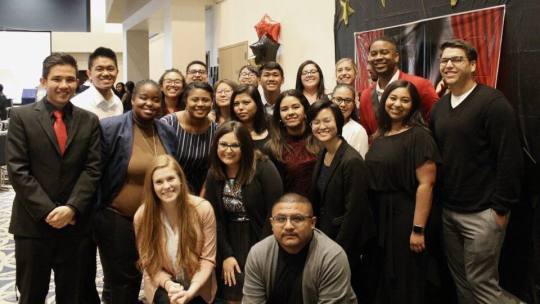
Cohort 11 after weeks of planning Rites of Passage.
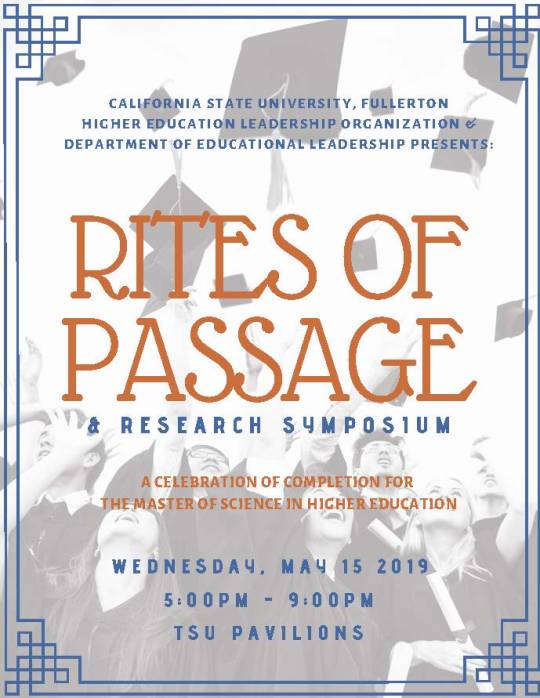
Our captivating advertisement for ROP created by Cohort member Ali Ulmen who was spearheading the Outreach Committee.
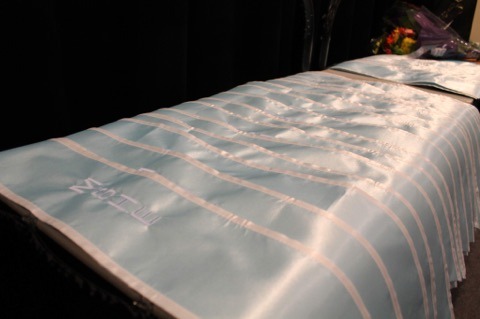
The beautiful sashes that were given to the graduating cohort members.
Reflection:
Rites of Passage was more than a graduation ceremony for me. It was a test of my ability to plan and delegate tasks of a very intricate event in preparation for Maywood in the Fall. Throughout the planning process, I felt very lost because everything fell on me to do and take responsibility for. The initial meeting with the previous HELO PECs was overwhelming because it was too much information to intake for just one person. I figured the best way to divide up the work and hold people accountable was to create different committees and delegate. It was difficult to get some cohort members to complete their tasks and respond at first. I ended up doing a lot of the outreach, collecting money, and planning on my own.
However, as the day of the event approached, some cohort members really stepped up and were able to motivate and encourage everyone in their committees to contribute. We were able to finalize the program with all the advertisements and secure the location, food, and set up for the event.
On the day of the event, things went really smoothly as all the cohort members showed up to help set up or clearly communicated if they were going to be late. We were able to set up the decorations, candy table, research posters, photobooth, and gifts for Cohort 10. The event itself ran a little bit longer because of the unexpected fire alarm, but like good student affairs professionals, we were adaptable and made things work out.
The event was a great success and I was extremely happy with the way it turned out. Speaking with some of the faculty and Cohort 10, they seemed to be pretty happy and satisfied as well. I appreciate the amazing opportunity I had to plan and organize this event. It gave me a lot of planning experience and prepared me for Maywood 2019!
0 notes
Text
2019 NASPA Annual Conference & MSHE Alumni Student Social
Term: Spring 2019
Description: Saturday, March 9th through Wednesday, March 13th was the 2019 NASPA National Conference hosted in Los Angeles, California. This year was NASPA’s 100th year anniversary and celebrates work-life integration, career advancement strategies, professional goals, and other relevant topics. In addition to the conference, I was responsible for organization the Master in Higher Education Alumni Student Social on the behalf of Higher Education Leadership Organization (HELO). This social was intended for current MSHE students and alumni to connect, network, and socialize.
Learning Outcomes:
Students will be able to plan and facilitate the MSHE Alumni Student Social during the 2019 NASPA Annual Conference
Students will be able to network professionally with MSHE alumni and professionals from different institutions in the field to gain knowledge and connections within Student Affairs
Students will be able to participate in a Knowledge Community event and meet other professionals/students in those communities.
Students will be able to attend different workshops and sessions to learn more about the Asian American identity in relations to student affairs and higher education.
Assessment Rubric:
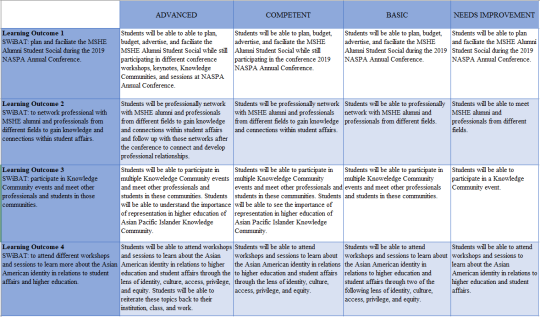
Learning Outcome 1 (ADVANCED) - Planning the MSHE Alumni Student Social was one of the most rewarding parts of NASPA Annual Conference. It was very stressful trying to find budget, contacting all the MSHE Alum, and planning out a date that works best for people during the already busy conference. I anticipated about 40 people attending the conference, but over 80 students, alumni, staff members, and faculty showed up. Dr. Eanes, the Vice President of Student Affairs, even came to support the event. Lastly, I was able to plan and execute this social while still attending many NASPA workshops, keynotes, sessions, and Knowledge Communities.
Learning Outcome 2 (COMPETENT) - During NASPA Annual Conference and MSHE Alumni Student Social, I was able to make meaningful connections. During the social, I was more worried about the logistics and planning that I did not have the best experience networking. However, I think many people did recognize that I was the person planning it. During the conference, I did a lot more networking and connected with many individuals who I previously worked with as well. However, I did not follow up with some of the new people I connected with and did not develop a professional relationship with them after the conference.
Learning Outcome 3 (ADVANCED) - I was able to attend three different Knowledge Community events during NASPA. I attended the APIKC Welcome, a social, and an APIKC award ceremony. Additionally, I was able to connect with an individual who I met at NASPA Western Regional. She currently sits on the board of the the Asian Pacific Islander Knowledge Community. She connected me with other individuals and gave me more insight on how to become more involved with APIKC. I also learned about the importance of representation of this community within the world of Student Affairs.
Learning Outcome 4 (ADVANCED) - Most of the sessions that I attended were for the Asian Pacific Islander community. One of the sessions, I attended was about creating a trauma informed narrative for Southeast Asians. This session was particularly eye-opening because it is a narrative that I have never heard of before. This session help me better understand some of the privileges I hold as an East Asian American. I was able to bring back some of these ideas to my work in Student Life and Leadership and to the Asian Pacific American Resource Center.
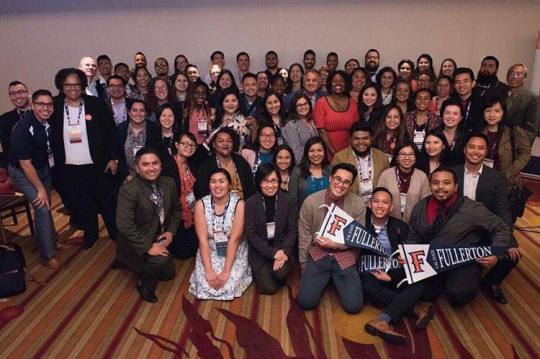
This picture was taken at the CSUF Reception for all the people who are or ever were a part of the MSHE program.
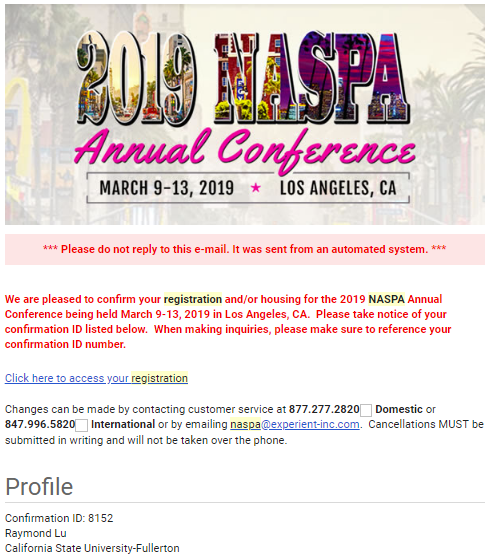
This is my registration confirmation for NASPA Annual Conference 2019.
Reflection:
The 2019 NASPA Annual Conference was an overwhelming yet amazing experience. I appreciated the empowering keynote speakers, especially Kal Penn because his speech really affirmed my career trajectory in Student Affairs. His speech tied in both politics and student affairs which are the two career avenues that I wanted to pursue. The sheer size of the conference was overwhelming but I am grateful that it was hosted in Los Angeles because it is a space I know how to navigate.
I really want to learn more about my Asian American identity and how that plays into student affairs or higher education. I took this conference as an opportunity to learn more about my identity and connect with the Asian Pacific Islander Knowledge Community. One of the people I connected with from APIKC gave me more information on how to become a board member which is something I really considered. However, I knew that I would be spreading myself really thin if I tried to do APIKC, Maywood, Graduate Assistantship, HELO, and APIDA Heritage Month Committees, and fieldwork so I decided against it. But I would still like to be involved with the community.
Last and proudest thing about the conference was the MSHE Alumni Student Social that I planned and executed. I think it was really rewarding to see so many past cohort members return and network. It was pretty difficult planning the social because there were so many moving parts. I had a confirm a date, time, and location that worked for most people. I had to contact Educational Leadership to find the contacts of our alumni. The day of the social, I was incredibly nervous that no one would show up. However, over 80 people attended the event and I received a lot of positive feedback about the event.
0 notes
